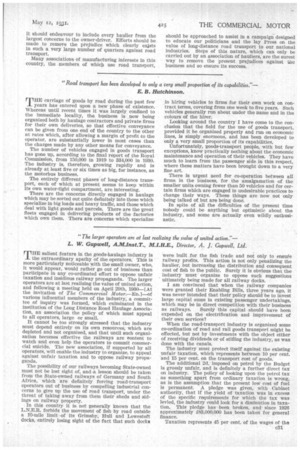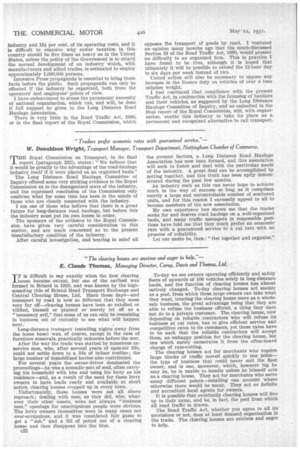"The larger operators are at last realizing the value of
Page 93

Page 94

If you've noticed an error in this article please click here to report it so we can fix it.
united action."— L. W. Gupwell, A.M.Inst.T., Director, A. J. Gupwell, Ltd.
T11E salient feature in the goods-haulage industry is the extraordinary apathy of the operators. This is more particularly noticeable with the small owner, who, It would appear, would rather go out of business than participate in any co-ordinated effort to oppose unfair taxation and insidious railway propaganda. The larger operators are at last realizing the value of united action, and following a meeting held on April 29th, 1930—[At the invitation of The Commercial Motor.—En.]--of various influential members of the industry, a committee of inquiry was formed, which culminated in the institution of the Long Distance Road Haulage Association, an association the policy of which must appeal to all operators, large or small.
It cannot be too strongly stressed that the industry must depend entirely on its own resources, which are depleted and not organized, and that until such organization becomes effective the railways are ontent to watch and even help the operators to commit commercial suicide. The new association, if supported by all operators, will enable the industry to organize, to appeal against unfair taxation and to oppose railway propaganda.
The possibility of our railways becoming State-owned must not be lost sight of, and a lesson should be taken from the State-owned railways of Germany and South Africa, which are definitely forcing road-transport operators out of business by compelling industrial concerns to give up the use of road transport, under the threat of taking away from them their sheds and sidings on railway property.
In this country it is not generally known that the L.N.E.R. forbids the movement of fish by road outside a 10-mile limit -of its Grimsby, Hull and Lowestoft docks, entirely losing sight of the fact that such docks were built for the fish trade and not only to ensufe railway profits. This action is not only penalizing the haulier, but increasing the distribution and consequent cost of fish to the public. Surely it is obvious that the industry must organize to oppose such suggestions ultimately being made for all railway docks.
I am convinced that when the railway companies were granted their Enabling Bills, three years ago, it was never intended that their policy should be to invest large capital sums in existing passenger undertakings, which may be in direct competition with their business as railways. Surely this capital should have been expended on the electrification and improvement of their own services?
When the road-transport industry is organized some co-ordination of road and rail goods transport might be effected, but not by investments with the object either of receiving dividends or of stifling the industry, as was done with the canals.
The industry must protect itself against the existing unfair taxation, which represents between 10 per cent. and 15 per cent. on the transport cost of goods.
The additional 2d. imposed on petrol by the Budget is grossly unfair, and is definitely a further direct tax on industry. The policy of looking upon the petrol tax as something apart from ordinary taxation is wrong, as is the assumption that the present low cost of fuel is permanent. A pledge was given, with Cabinet authority, that if the yield of taxation was in excess of the specific requirements for which the tax was levied, the industry could look for a diminution in taxation. This pledge has been broken, and since 1926 approximately £83,000,000 has been taken for general finance.
Taxation represents 45 per cent, of the wages of the c31 industry and 13i per cent. of its operating costs, and it is difficult to conceive why motor taxation in this country should be five times as heavy as in the United States, unless the policy of the Government is to retard the normal development of an industry which, With manufacturers and allied trades, is estimated to employ approximately 1,000,000 persons.
Intensive Press propaganda is essential to bring these facts before the public. Such propaganda can only be effected if the industry be organized, both from the operators' and employees' points of view.
I have endeavoured to stress the paramount necessity of national organization, which can, and will, be done if full support be given to the Long Distance Road Haulage Association.
There is very little in the Road Traffic Act, 1930, or in the final report of the Royal Commission, which opposes the transport of goods by road. I ventured an opinion many months ago that the much-discussed Section 19 of the Road Traffic Act, 1930, would present no difficulty to an organized firm. This in practice I have found to be true, although it is hoped that ultimately it will be possible to extend the 12-hour day to six days per week instead of two.
United action will also be necessary to oppose any increase in the licence duty on vehicles of over 4 tons unladen weight.
I feel convinced that compliance with the present Traffic Act, in conjunction with the licensing of hauliers and their vehicles, as suggested by the Long Distance Haulage Committee of Inquiry, and as embodied in the final report of the Royal Commission, will, with organization, enable this industry to take its place as a permanent and recognized alternative to rail transport.




































































































































































































